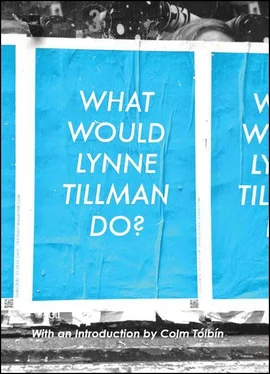A disturbing event happened just weeks before I left for Tangier. I received a copy of a letter Jane Bowles’s agent had sent Paul Bowles. It warned of my imminent arrival, that I was trying to steal Jane Bowles’s work, that I was, in short, a thoroughly bad character. The letter was meant to deter me, I suppose. But how did the agent know I was going to Tangier? What network was I in, who had betrayed me? All along I’d been writing to Bowles about my dealings with the agent and the Library of Congress, detailing my mostly futile attempts at getting to the bottom of things, where truth supposedly resides. I felt I had nothing to hide. Obviously, I was naive. If I make any money from the film, I wrote him, I’d be happy to give you half. He had not profited from the recent sale of the rights, and the idea that I was in this for the money was grotesquely amusing.
The situation had become byzantine. Everything connected closely to Paul Bowles, I would discover, was and wouldn’t be a surprise to him. He knew much worse characters, perhaps, than I could ever be or aspire to — Cherifa, for instance, Jane’s Moroccan lover. She was rumored to have poisoned Jane. I didn’t believe this and hoped Paul Bowles didn’t, either, just as I hoped he wouldn’t believe I was the mercenary, flawed character the agent described. David Hofstra, a musician and the man I live with, accompanied me to Tangier. We took a room in the famous — now defunct — Hotel Ville de France. Matisse had stayed there and painted the view out of his hotel window. David and I went immediately to see Buffie. She was waiting for us in the apartment Jane Bowles had lived in years before, just above Paul’s. (The Bowleses kept separate apartments.) Then, like a security guard, Buffie escorted us to Paul’s apartment, and walking down the stairs, my breathing became stuck in me or suspended. My life was about to change or stay shockingly the same.
We knocked, the door opened, we entered and were introduced to Bowles. He was, he said, about to go to the beach. Would we come back tomorrow afternoon? I handed him the script, we left and I breathed. I didn’t know what he was wearing or even what he looked like. If I had an image of him, it wasn’t contested by the reality of seeing him. I hadn’t seen him. He might be running away from me, I thought, but when he was there the next day, I decided he wasn’t. Maybe just stalling for time. (Later I was told that days before, another writer had rushed from London to Tangier, to advise him not to sell the rights. But did he have them to sell?)
He liked the script, Bowles told me; it was faithful to the book. But, he said firmly, I can’t help you. My lawyer had asked the other lawyer for evidence, a document authenticating ownership of the rights. None was ever produced. My lawyer believed Paul Bowles could exercise his rights as the inheritor of Jane Bowles’s estate, if he wanted. Yet what Bowles had once written me spun another cautionary literary tale. A publisher had gone to Spain to see Jane in the hospital. The publisher asked Paul to leave the hospital room, so he could be alone with her, and when the publisher emerged, he held a piece of paper in his hand. The publisher had gotten Jane to sign something, when she didn’t know what she was signing. On this scrap of paper, the film rights to the book rested. That was the story. Bowles never contested the publisher’s claim. He lived in Tangier, it was explained to me, precisely because he didn’t want to become involved in ordinary and tawdry matters like fights over rights.
Now, a little numb or stunned, with the film out of the way, or dead, I could try to have a good time. There I was, sitting with Paul Bowles in his darkened living room, drinking tea served by the taciturn Mohammed Mrabet, Bowles’s companion. I’d read Mrabet’s stories, which Bowles had taped and written down. They were published in Mrabet’s name, but bore the mark of Bowles’s spare, elegant style. Mrabet, I found out later, had once asserted that Bowles was merely his typist.
I greedily listened to Bowles’s stories about Jane and himself. In 1943, during the war, when Jane was living in New England with her lover, Helvetia, he told us, he was in Mexico. He was still writing music and needed one of his instruments — a drum. But he couldn’t remember where it was. He wrote Jane and asked if it was in Staten Island, or with her in New England, or in their apartment in New York? There was some urgency to his request, and Jane Bowles sent a telegram in return: Drum not in basement, not on Staten Island, not in New York. Drum can’t be found. The day after, the doorbell rang at Jane’s residence. It was the FBI.
FBI: Your husband was in Morocco in the spring of 1942?
Jane: Yes.
FBI: And in South America in the fall of that year?
Jane: Yes.
FBI: He’s in Mexico now?
Jane: Yes.
FBI: Why does he travel so much?
Jane: I guess he’s restless.
By now Helvetia, at Jane’s request, was burning some of their papers in the fireplace, though it was the summer. But after questioning her a little longer, the FBI was mollified. It turned out that there was a colonel in the army named Drum, and her telegram had been intercepted — all telegrams were read during the war. The FBI thought they might have uncovered an underground group plotting to assassinate Colonel Drum.
In Bowles’s darkened living room, above the couch, was a single bookshelf. On it were all of Jane Bowles’s books, all the editions, in all the languages into which they’d been translated. The shelf was a shrine to her, and I felt her presence in his life and in the room through her books. I plucked up the courage to question him about her novel. Why had Jane Bowles named one of the serious ladies Miss Goering? Bowles looked amused and said: That was Jane’s little joke.
I remember saying, tentatively: I think I’ve got an idea for another novel. Bowles nonchalantly said, I haven’t had an idea in twenty years.
We intended to take him to dinner but didn’t. We visited him three times and met him on the street once. We took photographs of him alone, with Buffie, and of Buffie alone. David took some of me and them. Bowles didn’t like being photographed and turned wooden. I made him laugh in one and that shot came out blurred. It was too bad. He looked very handsome laughing.
Paul Bowles never mentioned Kathy Acker’s quote. I shouldn’t have been surprised. Some years before I’d mailed him a story in which I’d quoted a line from his autobiography, Without Stopping . He wrote a long letter about it and questioned me on an interesting point of grammar. He never mentioned my tribute to him. His reserve, discretion or secretiveness was impressive, intimidating, or disturbing.
It’s unsettling and strange rendering this account and calling up faulty memory to describe my pilgrimage, if that’s what it was, to him and the spirit of Jane Bowles. I was as close to her as I’d ever be. Her presence was almost palpable — I wanted her to be there — and always evanescent, like life itself. Even stranger was the sensation I had when I was with Paul. Sometimes I felt I was his daughter, as if that quote had created a symbolic link between us, even a blood tie, in an extraordinary demonstration of the power of fiction. It was a feeling, too, that I got, after my father died, around older men I liked who were difficult to know, the way my father was. I admired Bowles’s writing, its inscrutability, lack of apology and explanation, its dark humor, reserve, mystery. He had all of this, too. I didn’t know him, I liked him, I didn’t know what he thought of me. We laughed together, and I can like or feel familiar around anyone who’s funny.
I gave up the film, returned one of the grants, was allowed to keep the other and use it toward writing the novel I’d mentioned to Bowles. It was called Motion Sickness , which now seems an appropriate title for the experience of writing this weird history of failure and desire. Two Serious Ladies has still not been made into a film.
Читать дальше












